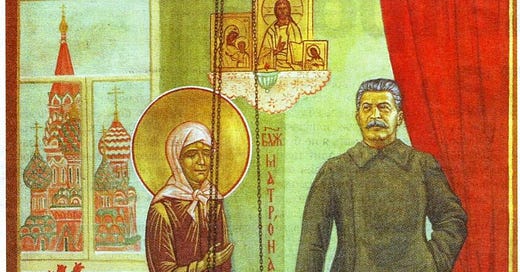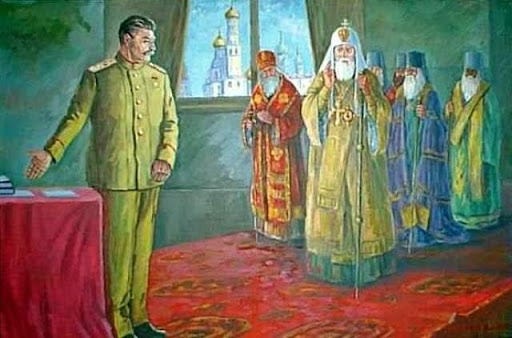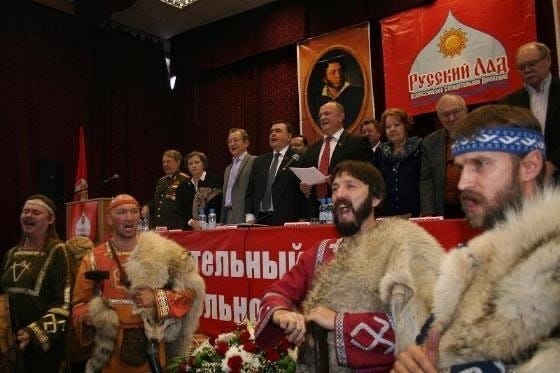I often meet the assertions that Joseph Stalin restored the Russian Orthodox Church - in the midst of the WWII - to boost the patriotic feeling of the Russian people. So, basically, to leverage religion in rallying the national effort on the defence of motherland, against the foreign aggressor.
That is almost certainly false
Based on the sources available, it does not look like the feelings of religious & observant populace played any major role in Stalin’s decision1. To put it in simple terms,
Stalin restored the Orthodox Church, because Roosevelt asked him
Since the German invasion of Russia in 1941, FDR has repeatedly, many times, pressured Stalin to restore the religious freedom in the USSR. More specifically, he conditioned the continuous flow of American supplies to the struggling Soviets upon Stalin restoring it.
And, eventually, Stalin would accede to this demands.
Some chronology2:
22 June, 1941. Germans invade the USSR. Next very day after the invasion Roosevelt stresses the absolute importance of religious freedom in his letter to Stalin3.
September 1941. The German army is approaching Moscow. Anglo-American delegation (Harriman-Beaverbrook mission) is ready to depart to Moscow to discuss the lend lease project. Basically, provide the USSR with military & economic aid to bolster its war efforts.
That was the moment of Stalin’s dire, absolutely dependency upon the American goodwill, and Roosevelt knew it. He informed the Soviet ambassador in DC, that it will be very difficult to pass any aid packages through the Congress, unless Moscow backtracks on its anti-religious campaign.
“If Moscow could get some publicity back to this country regarding the freedom of religion during the next few days without waiting for the Harriman mission to reach Moscow, it might have a very fine educational effect before the next Lend-Lease bill comes up in Congress.”
You see that he is tying the question of aid, to the question of religion. It is not only me who wants it, he says, it is the entire Congress. And I need to pass the bill through the Congress, there is no roundabout . So, if you do not get back any publicity (= mend your ways) before the vote ( = right now), I won’t be able to do much for you.
FDR is basically blackmailing Stalin on this matter, and not through one, but through many channels. He is blackmailing him directly, in letters. He is blackmailing him through the Soviet ambassador in DC. He is blackmailing him through the American mission in Moscow4. He is forcing the mention of religious freedom into the future UN Charter, and, after some fuzz, Soviets accede to it.
1942 - Stalin gets to slowly rescind his anti-religious and anti-church policies
September 1943 - Stalin invites a group of bishops into his country estate, and informs it of his decision to restore the patriarchate of the Russian orthodox church. Next day, the official newspaper of the Soviet government, Pravda, announces that Stalin permitted to convene a council of bishops, to elect the new patriarch, the new leader of the orthodox hierarchy.
November 1943. Just two months later, Stalin was to meet Roosevelt and Churchill for a major conference. And he needed to produce some visible signs of easing his stance on church before the meeting.
Stalin meeting the bishops, restoring the Church
All to untie his hands in Tehran. Now as he conceded to Roosevelts demands, he can ask him for some concessions as well. Most importantly, he can ask for more aid, lots of aid, and as soon as possible.
***
So what pattern do we observe here?
We see that the primary reason behind the restoration of the Russian Orthodox Church was that the American, and not the Russian public opinion wanted it. Restoration of the church was domestic politics optimised, but the domestic politics in question were American and not Russian politics. Stalin needed American supplies, and if these supplies were conditional upon dancing some stupid dance, then, sigh, he has no choice but to dance their stupid dance and pretend he is enjoying it.
So, basically, if a politician doing something there is a high chance he is doing it to court some public opinion, somewhere. But that may not necessarily be the public opinion of his own countrymen. That, in fact, very much depends
Still, what you have is less of a politician vs politician interaction (= so called “realist” picture), but a much more complex, multi-level interaction, which may absolutely includes targeting the audience in a country other than your own5. What “realism” gets wrong is that it discards these multiple layer interactions (Stalin doing stuff because that is what the conservative republicans and the Catholic church in the United States want), and reduces it all to an absurdly simplified picture of a uniform, homogenous “state” (that has no internal structure of its own) is dealing with another “state”, that also has no internal structure. And that is not what is actually happening.
Second. The thing with politics is that imbeciles (who are many) cannot see it otherwise that the pure, artistic self expression. Stalin did this or that? Stalin said this or that? So that is what he wants to, or believes in, or if it is not him, then, well, his people want. If not Stalin, then it is the Russian people who stand behind him.
That is not necessarily the case. Very often, you do this or that, not because you want to, not because you like to, not because it expresses your ideas and your values, but simply because you have to, and you see no other way to reach your bigger goal. In this particular case, it is all very straightforward, Stalin needs America, Stalin depends upon America, so he has no other choice but to pander to certain of their preferences which he - and those around him - privately find laughable and ridiculous.
(Molotov - notably - did not believe at all in Roosevelt being sincere. Being a smart man, how can he really be in all this religious stuff? No, he is clearly faking it all for political purposes:
“At one point…he asked me whether the President being such an intelligent man really was as religious as he appeared, or whether his professions were for political purposes”, Harriman recalled)
Third, and perhaps most importantly. Stalin’s position towards the church was not based on any grand design, nor any particular vision, nor even his personal convictions. There was no strategy behind it. It was purely a chain of tactical decisions, motivated by being locked in an existential war against a highly capable enemy, and needing the foreign help really, really much, being, therefore unable to say no to the provider of said aid. There was no singular logic, nor ideology here, just backtracking, and backtracking and backtracking again, and compromising - again - on a symbolic and ultimately unimportant matter.
BUT
Once it happened, and once the decision has been taken - for whatever reason - it now lived its own life. You see, nuances - such as “we did X and Y for tactical purposes only” do not really transcend through the cultural barriers. This, of course, includes generational barriers, as well. What you did ironically, your future successors (or admirers) will be doing unironically - and rightly so. The tides of history cleanse all the irony, because they cleanse all the actual meaning from your actions. What you did, remains. What you meant by that, is cleansed, and lost forever, and nobody cares.
New generations put their own, new meaning in your actions, and work out a harmonious, logical, non contradictory picture out of it. They are no longer interested in what had actually driven you, in what motivated you, in what stood behind this or that decision. That is all ancient history, and does not really matter. What matters is the problems of the modern day.
In the modern day, Russian Communist Party is basically the GOP in every regard possible. It is the party of the old people, of pensionaries, of social and cultural conservatism. And, as every conservatism, modern Russian communism is by necessity eclectic seeking to reconcile the irreconcilable elements of the past (e.g. communism and church), all to build a clear, harmonious and straightforward picture.
And now the final irony of the whole situation is that this picture (although historically fake) is not just made up, but rather based on the real, historical events - which have been stripped off of all their contemporary meaning, by the tides of time. What had been a sequence of tactical actions, taken under the foreign pressure, and solely to secure the foreign material aid, becomes the only natural, logical, and, of course, proactive course of actions, driven by your internal values, and your self expression. Whatever does not get fit into this picture, will be thrown out.
When you think of the Russian Communist Party, you can best imagine it as a Russian analogue of GOP, rather than anything relating to, or similar to the early Bolshevism. It is not so much Marxist, as vaguely “trad”, a fusion of the Soviet, Orthodox and, of course, neo-Pagan aesthetics. In theory, Soviet does not match very well with the Orthodox, and Orthodox, in its turn, with Pagan. In practice, however, they are all now coded as “trad”, as the nuances of meaning have been washed away by the tides of time. So, politically speaking, there is not much difference between the hammer & sickle, an orthodox icon and a viking-ish fur pelt, for it all has been fused into the one, indistinguishable trad-core, as a part of our common, historical heritage.
That is not only because most of this population was too frail and old to matter. That is also because of the massive cultural change that the Soviet society went through, that totally re-shaped it, and made most of the old values the thing of the past. We, retrospectively, tend to massively underestimate how much did the culture and memespace change in the course of 1917-1941, and how little did the past matter now
I base the narrative below on the Butler, Susan. Roosevelt and Stalin: portrait of a partnership. Vintage, 2016. Quotes below are borrowed from this book.
“Freedom to worship God as their consciences dictate is the great and fundamental right of all peoples…To the people of the United States this and other principles and doctrines of communistic dictatorship are as intolerable and as alien to our own beliefs, as are the principles and doctrines of Nazi dictatorship”
Ambassador Harriman later recalled: “The President wanted me to impress on Stalin how important it was to ease restrictions on religion. Roosevelt was concerned about possible opposition from religious groups… [Stalin] nodded his head and indicated what I understood to mean a willingness to see that something was done.”
When does this happen, specifically?
Well, let’s be honest, that is usually happening when you are talking up, talking to someone you depend upon. Then you have to actually, unironically dig into the nuances of their culture, their public opinion, and target it specifically. I would say that a certain American blindness in dealing with the outer world largely results from its hegemon status. You do not really have to ask anyone for anything (which is good), but as a result certain of your mental muscles just atrophy.








"The tides of history wash away all meaning from the actions." What a gem!
Are you familiar with the work of Quentin Skinner? Particularly his work on rhetoric and the importance of viewing political writings in the context of the debates in which they were offered.
I think you might agree that the human tendency to reject the contingent nature of our lives and struggles, to universalize our current struggles down to the most fact-dependent detail, is one of the great barriers to understanding of the world. The theory-saturated body of opinion that emerges from this universalizing, homogenizing process leads to a view of interests that some like to call "realism" - but it is much more a Hegelian sort of realism than the pragmatic assessment of the state of world affairs that the term might lead a modern reader to expect.